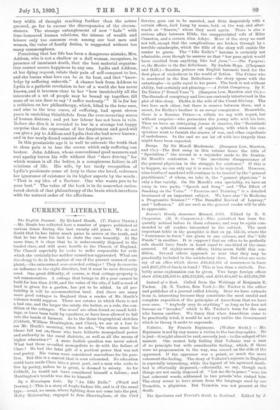By a Himalayan Lake, By "An Idle Exile." (Ward and
Downey.)—This is a story of Anglo-Indian life, and is of the usual type,—usual, we mean, where fighting does not come into the plot. Hetty Mainwaring, engaged to Jem Sherringham, of the Civil
Service, goes out to be married, and flirts desperately with a certain officer, Jack Lang by name, both on the way, and after- wards at " Simree," where they meet again. There is also a serious affair between Hilda, the unappreciated wife of Miles Cranston, and a certain Alan Adayr. More of the story we need not tell, except that the complications are broken through by a terrible catastrophe, which the title of the story will enable the reader to guess. The "Idle Exile's" heroine is certainly not admirable, even though he assures us that "her pure spirit would have recoiled from anything like bad form."—The Vyvyans; or, the Murder in the Bue Bellechasse. By Andrle Hope. (Chapman and Hall.)—Russian princes run English baronets bard for the first place of wickedness in the world of fiction. The Prince who is murdered in the Rue Bellechasse—the story opens with the catastrophe—is quite equal to his peers. The book is not without ability, but certainly not pleasing.—A Polish Conspiracy. By E. Du Tertre (" Denzil Vane "). (Sampson Low, Marston and Co.)— The threads of conspiracy and love are curiously intertwined in the plot of this story. Etelka is the wife of the Count SOnizny. The two love each other, but there is reserve between them, and a secret, for Etelka's brother is an enrage conspirator. Meanwhile, there is a Russian Prince—a villain we say with regret, but without surprise—who persecutes the young wife with his love. Then we have an intriguing femme de chambre, the " Beriatinski Star," a splendid ornament of sapphires, with which the con- spirators want to furnish the sinews of war, and other expedients of melodrama. In the end we are let off with less tragedy than might have been expected.


































 Previous page
Previous page